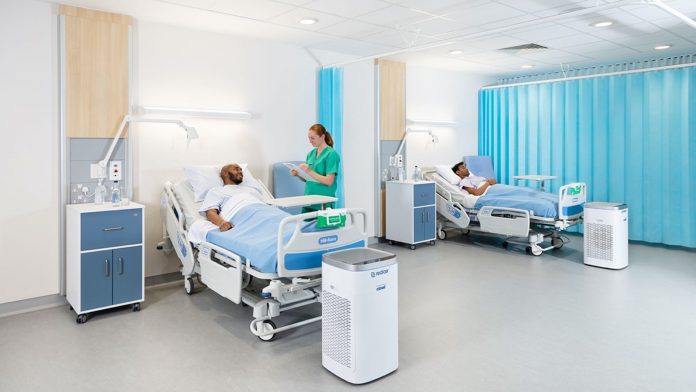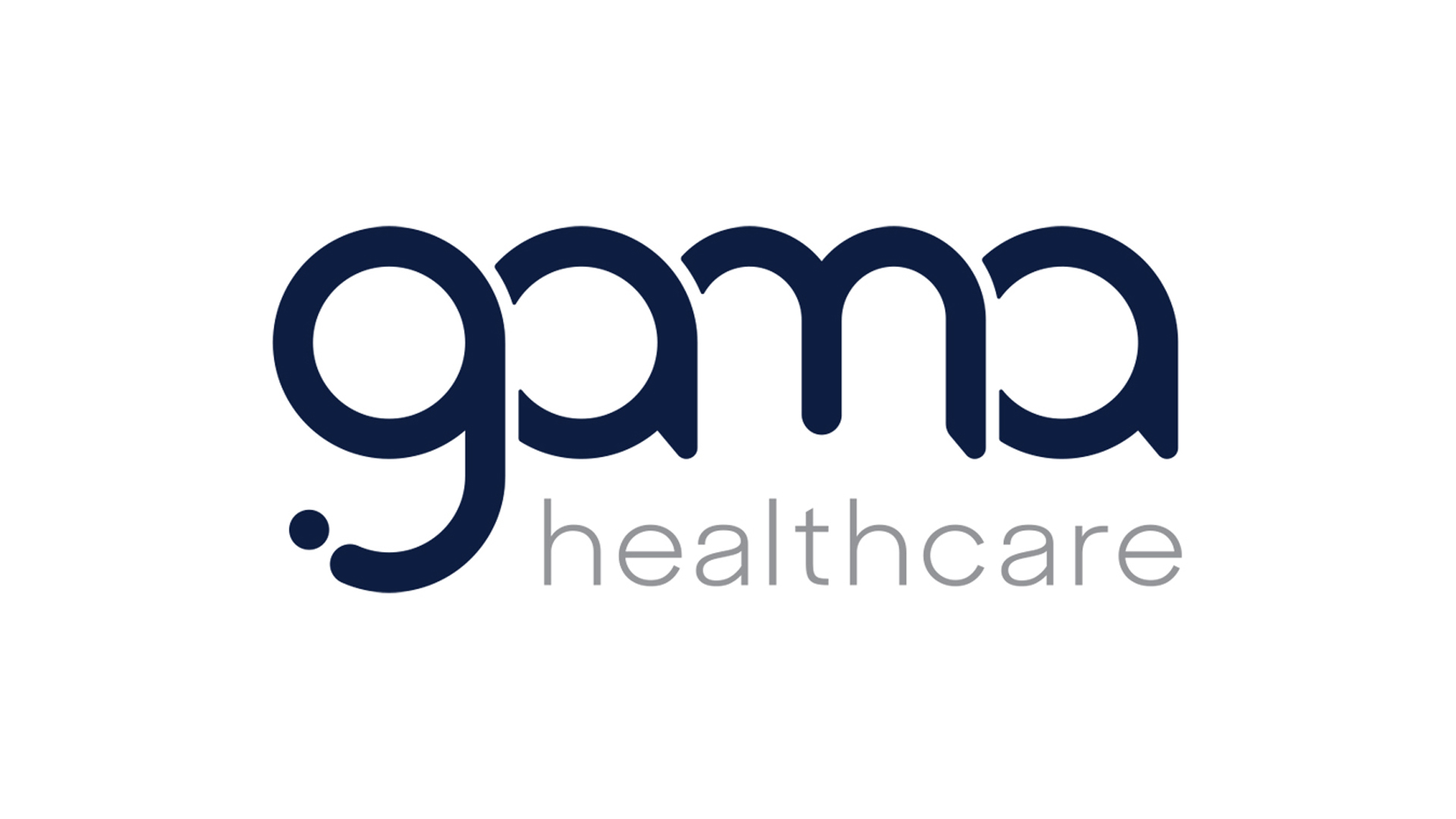
Air filtration systems are increasingly recognised as a valuable method of infection control, GAMA Healthcare outlines the benefits of its adaptable Rediair system.
Environmental decontamination and hand hygiene are universally recognised as important methods for reducing the risk of infections and keeping people safe. However, adequate ventilation is vital for ensuring the air within hospitals and workplaces is safe. Aerosols and droplets carry infectious microorganisms in the air that can spread infections more easily within poorly ventilated spaces.
Effective air filtration systems can help remove these microorganisms and particulates from the air by drawing air through the machine, trapping the contaminants within a HEPA filter and blowing clean air back into the room.
Aerosol and droplet transmission
We constantly release bacteria, viruses, and fungi into the air around us. Pathogens like Mycobacterium tuberculosis, influenza, RSV and coronaviruses are found in droplets and aerosols expelled when we talk, cough or even breathe, potentially infecting other people or landing on and contaminating surfaces.
Droplets are particles above five micrometres (µm) in diameter that typically settle within two metres, while aerosols are smaller particles (below five µm) that remain airborne longer and spread over large distances. Infectious aerosols can be inhaled, deposited on our susceptible mucous membranes, or transferred to our mucous membranes by contaminated hands. There is also the risk of particulates and odours triggering allergies or discomfort.
Benefits of air filtration
Portable HEPA filters can reduce the risk of inhaling viable pathogens within a poorly ventilated area. Unlike traditional air filtration systems found in shared spaces, portable air filtration devices give you the flexibility to provide clean air where and when you need it.
Air filtration systems can capture a variety of contaminants such as:
• Airborne pathogens (bacteria, fungi and viral aerosols);
• Fine and ultra-fine particles;
• Dust;
• Mites;
• Odours; and
• Pet dander.
Air filtration in healthcare
Healthcare facilities such as operating theatres or intensive care units, will have specialised fixed mechanical ventilation systems built in. However, in open wards and shared spaces, hospitals might lack effective air filtration. Installing cumbersome, fixed mechanical systems can be difficult. Not only are they expensive, but during installation, wards must be emptied and closed until they are installed, tested and ready for use. Additionally, repairs can be very disruptive to healthcare professionals and patients; if the machines malfunction or break, all ventilation is lost, costing more money to fix, and increasing the risk of infection during the downtime.
Meanwhile, COVID-19 variants like Delta and Omicron are currently prominent. Effective air filtration within healthcare facilities is therefore vital for capturing these harmful microorganisms and removing them from the surrounding air. In a recent study, Dr Andrew Conway Morris of the University of Cambridge expressed that it was surprising how effective air filters were at removing airborne SARS-CoV-2 on the wards.1
More evidence is required to demonstrate the benefits of air filtration in reducing the risk of transmission of infectious microorganisms. Still, the importance of good ventilation is widely acknowledged within the discourse surrounding healthcare facilities and offices.
Finding the right device for you
Choosing an air filter with the appropriate features and functions can be confusing, as procurement and infection prevention teams come to terms with the language and norms associated with air purification systems. Ultimately, the filtering efficiency will depend on the air purifier’s power, filtering capacity, and the space volume in the room.
HEPA filters
HEPA stands for High Efficiency Particulate Air. HEPA H13 – H14 is considered medical-grade quality, with HEPA 14 filtering a minimum of 99.995% particles down to 0.3 microns in diameter. Additionally, pre-filters protect and prolong the life of the HEPA filters, and carbon or charcoal filters reduce unwanted odours and Volatile Organic Compounds (VOCs).
Clean air delivery rate (CADR)
Measured in cubic metres per hour (m3/hr), CADR is an industry-standard measurement of the air volume that the air purifier can clean. The higher the number, the more effective a device is. An air purifier with high and variable flow rate options will ensure adequate air changes every hour.
Patient comfort
Noise levels (dB) is a significant consideration when used in a patient room. Look for a product that provides both minimum and maximum noise levels, reflective of low or high fan settings. Also, a night mode function cuts the lights and the noise to give patients a chance to rest and recover.
Rediair
Designed by infection prevention experts, Rediair is a portable air purification device that captures particles as small as 0.3µm and has a CADR rate of up to 600m3/hr.
-
Dual HEPA 14 filtration
At the heart of Rediair are two carbon composite HEPA 14 filters that work in tandem with the dual centrifugal intake fans and easy-to-clean nylon pre-filters to capture particulates, odours and 99.995% of airborne pathogens.
-
High clean air delivery rate
Due to its dual-intake filtration system, Rediair has an exceptionally high CADR of up to 600m3/h. Despite its small form factor, a single unit provides effective ventilation for rooms up to 120m3.
-
Ultra-low noise
Rediair is powerful yet surprisingly quiet when in normal use. It features many different settings and speeds, and is designed to operate without causing distraction.
The nylon pre-filters, composite carbon cloth and HEPA 14 filters capture particulates, expelling purified air back into the room, providing up to five air changes an hour within a space up to 120m3. Rediair’s different operating modes allow Rediair to be used almost anywhere, from waiting rooms and offices to dental treatment rooms.
Flexible filtration
Rediair’s dual HEPA 14 and carbon cloth composite filters decontaminate a room’s air almost instantly. Plug in, select your mode, and let Rediair do the rest; it is that simple. Adaptable to many different situations, Rediair has four operating modes to choose from:
Automatic mode
Rediair uses intelligent particulate sensing to detect air quality and automatically adjusts the fan speed to effectively remove contaminants whilst displaying the current air quality via its LED air quality indicator.
Manual mode
Rediair’s manual mode allows you to tailor its operating parameters to whatever situation you need. Navigating through its simple digital display to select fan speeds, operating times, and light modes, Rediair offers quick and simple to use air purification.
Turbo mode
Turbo mode spins both centrifugal intake fans at top speed, significantly increasing its CADR up to 600m3/h, removing contaminants more quickly and effectively.
Night mode
Rediair uses its built-in light sensor to monitor the room’s light. When light levels fall, Rediair will switch off all LEDs and displays and lower fan speeds to provide near-silent decontamination throughout the night.
Rediair is an incredibly subtle air filtration system. While the internal mechanisms are complex, using Rediair is quite the opposite. The intelligent air quality indicator can read the quality of the surrounding air and start decontamination within seconds of activation.
For more information about Rediair, visit www.gamahealthcare.com/rediair or contact your local GAMA Healthcare representative.
This article is from issue 21 of Health Europa Quarterly. Click here to get your free subscription today.

























